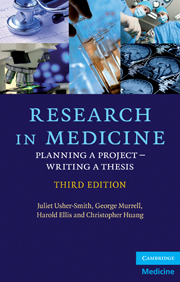Book contents
- Frontmatter
- Contents
- Preface
- 1 Introduction
- 2 Deciding whether to do research
- 3 Deciding when to do research
- 4 Selecting a research degree
- 5 Choosing a department, research supervisor and project
- 6 Applying for research positions and funding
- 7 Getting started
- 8 Overcoming frustration
- 9 Writing scientifically
- 10 Publishing a paper
- 11 Attending scientific meetings
- 12 Writing a thesis
- 13 Submitting a thesis and preparing for the viva voce examination
- Further reading
- Appendix: Information for research students wishing to study overseas
- Index
3 - Deciding when to do research
Published online by Cambridge University Press: 05 May 2010
- Frontmatter
- Contents
- Preface
- 1 Introduction
- 2 Deciding whether to do research
- 3 Deciding when to do research
- 4 Selecting a research degree
- 5 Choosing a department, research supervisor and project
- 6 Applying for research positions and funding
- 7 Getting started
- 8 Overcoming frustration
- 9 Writing scientifically
- 10 Publishing a paper
- 11 Attending scientific meetings
- 12 Writing a thesis
- 13 Submitting a thesis and preparing for the viva voce examination
- Further reading
- Appendix: Information for research students wishing to study overseas
- Index
Summary
Biological scientists not proceeding to do medicine usually attempt their higher degrees immediately after their first degree, often continuing an interest arising from an honours degree project. Others return to university after a time working in industry. Medical students or doctors have a number of options, each with particular advantages and disadvantages. These relate both to the implications of taking ‘time out’ for research on future medical career prospects, and to the effects of this timing on the academic quality of the research. The main options for timing of research in medicine are:
Prior to medical training.
During undergraduate medical training.
Between undergraduate medical training and starting clinical work.
During clinical training.
Ultimately, the choice of when to do research will depend on a large number of both personal and professional factors and what is ‘best’ for one person may be very different from what is ‘best’ for another. Here we consider some of the advantages and disadvantages of the various options. Much of the text here relates to medical students and doctors within the UK, but details of the differences in other countries are included at the end of the chapter.
1. Prior to medical training
Research after a basic science degree may be very helpful for gaining entry to medical school, and often sets the groundwork for each of the later steps.
2. Research during undergraduate medical training
A year or more of research taken during undergraduate training, leading to a BSc, MPhil or PhD, is a well-recognized step in many universities. Indeed, this is often actively encouraged for the more successful students.
- Type
- Chapter
- Information
- Research in MedicinePlanning a Project – Writing a Thesis, pp. 9 - 16Publisher: Cambridge University PressPrint publication year: 2010

